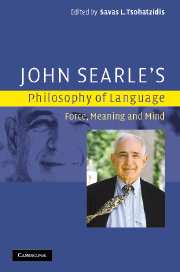Book contents
- Frontmatter
- Contents
- List of contributors
- Acknowledgments
- Introduction
- 1 What is language: some preliminary remarks
- PART I FROM MIND TO MEANING
- 2 Content, mode, and self-reference
- 3 Searle against the world: how can experiences find their objects?
- 4 Seeing what is there
- 5 Intentionalism, descriptivism, and proper names
- 6 On the alleged priority of thought over language
- 7 Rule skepticism: Searle's criticism of Kripke's Wittgenstein
- PART II FROM MEANING TO FORCE
- References
- Index
6 - On the alleged priority of thought over language
Published online by Cambridge University Press: 08 January 2010
- Frontmatter
- Contents
- List of contributors
- Acknowledgments
- Introduction
- 1 What is language: some preliminary remarks
- PART I FROM MIND TO MEANING
- 2 Content, mode, and self-reference
- 3 Searle against the world: how can experiences find their objects?
- 4 Seeing what is there
- 5 Intentionalism, descriptivism, and proper names
- 6 On the alleged priority of thought over language
- 7 Rule skepticism: Searle's criticism of Kripke's Wittgenstein
- PART II FROM MEANING TO FORCE
- References
- Index
Summary
Language, I contend, is the medium of conceptual thought. By “language” I mean spoken and written languages, such as English, Arabic, and Chinese. I deny that there is any such thing as a universal “language of thought”; so that is certainly not included in what I am calling “language.” By “conceptual thought” I mean the process of thought that consists in making judgments. For instance, the judgment that that (a certain object) is a reptile is a conceptual thought, and the judgment that some reptiles can swim is a conceptual thought. So my claim is that every judgment is an act of saying something, either out loud or in foro interno, in some language. But what I am calling conceptual thought is definitely not the only kind of mental process that deserves to be called “thought.” For example, there might be a kind of imagistic thought that does not necessarily involve the application of concepts. Perhaps very little of our mental problem solving is actually conceptual thought.
Exponents of the doctrine of language-independent conceptual thought like to portray themselves as heretics defying orthodoxy. However things might have been at one time, the language-independence of conceptual thought is now certainly the orthodox position, not the heresy. Anyone who dares to deny it can expect to be met with mockery and derision rather than serious arguments.
Information
- Type
- Chapter
- Information
- John Searle's Philosophy of LanguageForce, Meaning and Mind, pp. 125 - 142Publisher: Cambridge University PressPrint publication year: 2007
